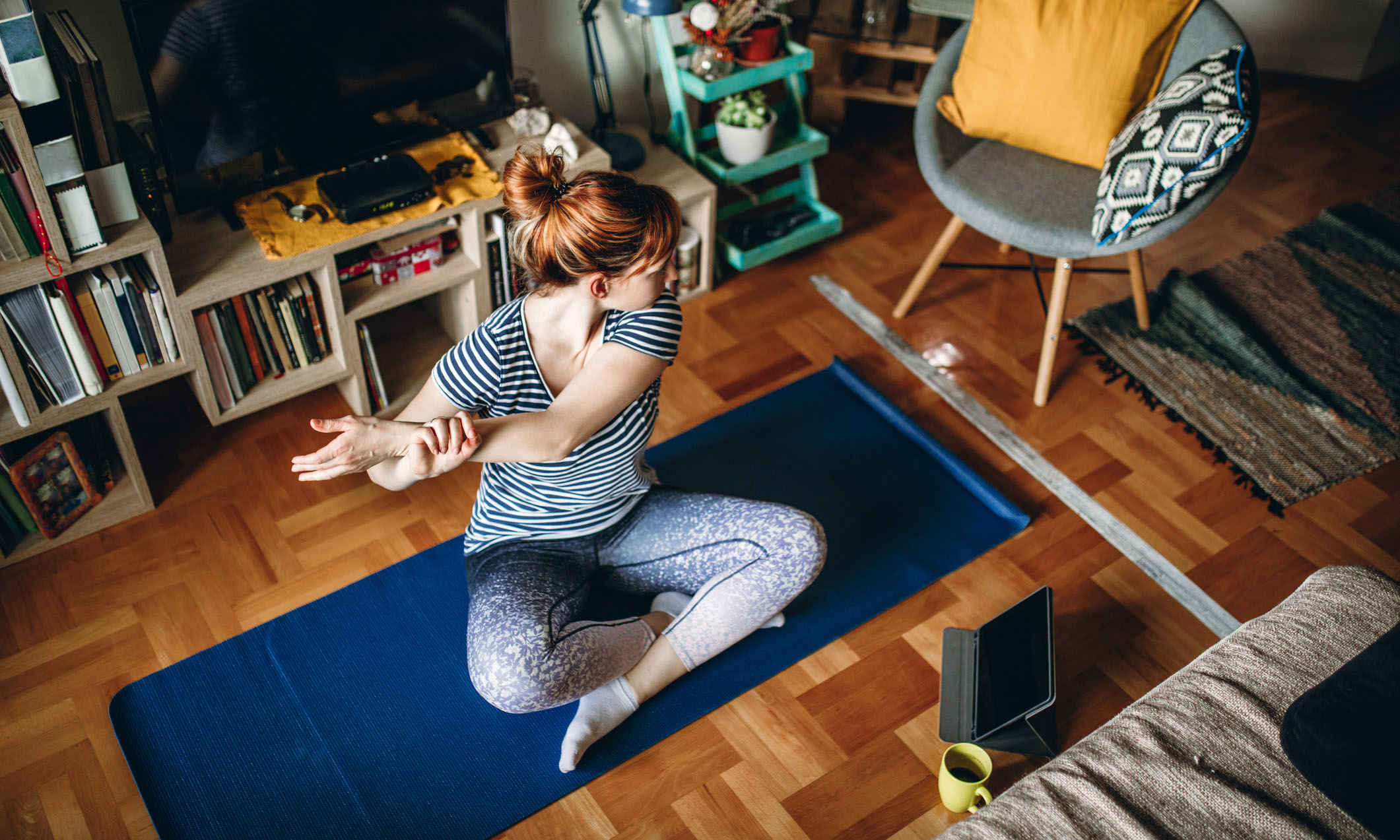
7AM: Set the tone for your day
Get up, get dressed and get organised! Your routine is obviously different to when going into the office, but try and start the day right – whether that includes a bowl of porridge for breakfast or a brisk walk around the block.
It’s also a good time to set goals for the day, even if you only have a few. Write a list and know what you want to achieve.
"I am a creature of habit and have had the same routine for years. I wake up, make some toast and put on a pot of coffee before sitting in front of the TV and flicking between channels while reading the news on my phone. I have never been a morning person so I need time to take it easy and just stare for a while before I feel human enough to start work." - Cassie Byrnes, Bachelor of Textiles (Design)
9AM: Enter your workspace
Take a look at your workspace. How does it stack up in this checklist?
Ample space for technology and notes
Plenty of light
Ergonomic desk, chair and display setup
Door for privacy during meetings, or noise-cancelling headphones
Your space should ideally be a work-only zone (if possible), so choose somewhere you can focus. Avoid working in areas you tend to be in relaxation mode, like on the bed or couch.
10AM: Schedule a digital coffee run
Keeping up your social habits when working from home is important for your mental wellbeing and can help you adjust to the change. And while having a brief scheduled coffee chat via Skype isn’t exactly the same as dashing out to your favourite café, it gives you the space to discuss that new show on Netflix without feeling the pressure to be in work mode at all times.
11AM: Keep your meetings productive
Define a clear agenda, purpose and outcome of your virtual meetings to help keep them on track (and on time). This could mean allocating a set amount of time for each person to present or asking the team to do a preliminary brainstorm before joining the meeting.
12PM: Take your full lunch break
One of the biggest mistakes you can make when working from home is blurring the line between work and life. It’s important to set a strict schedule for breaks, and don’t allow yourself to work through them unless it’s critical.
Physically leaving your workspace at lunch can help you stay on track. Challenge yourself to keep your break light-hearted – will you play hide and seek with the kids, have a picnic in your backyard or listen to your favourite podcast?

1PM: Update your team and stakeholders
Frequent communication makes it easier to stay on top of your workload. Even if it might seem trivial, a quick text message update makes a big difference in replacing that face-to-face contact.
If this is an art you have yet to perfect, allocate some time every day to go through your projects and provide updates to everyone involved. This could mean commenting on the digital task cards, or scheduling a daily video conference update with your team.
2PM: Block out time to work without distractions
From mobile phone dings to needy pets, distractions in your home may be constant. Appreciating that you need some time to get used to the new stimuli is the first step to improving how you deal with them. Turning off your phone, wearing noise-cancelling headphones, and allocating a no-meeting hour or two per day can also help hone your focus towards your to-do list.
3PM: Get some fresh air and sunshine
Feeling confined at this time is normal, especially if you’re used to working in central areas of your city. Fresh air, exercise and being in nature can all help to improve your mental wellbeing, so make it a point to leave your desk and get outside every day – even if it’s just spending 15 minutes in your backyard or on the balcony.

4PM: Reflect on your day
Psychologist Dr James Collett, from RMIT’s School of Health and Biomedical Sciences, says reflection is perhaps the most important thing you can do for your mental health while working from home.
“Make time to reflect: ‘Am I doing okay today? Am I feeling cooped up? Am I feeling like I need to get in touch with friends or just even ring someone to hear another person’s voice? What do I need to do if I’m not feeling okay?’
Monitoring how you’re doing is critical in getting on top of issues early as they inevitably bubble up, rather than ignoring them as they grow and get worse.”
You should also take a quick moment to check in with your team. Ask how their days went and see how they’re coping with any changes in working arrangements, too.
5PM: Hit the 'off' button
Sticking to a strict work schedule especially applies to the end of the day. Give yourself a little time to pack up your space and mentally ‘leave’ the office. Turn off your laptop, put your work phone on silent, and close your notebook.
This also prevents setting unrealistic expectations for your working capacity. If you’re checking emails at 11pm every night, it may give others the impression that you can pick up more than your fair share of tasks.

6PM: Check in with your loved ones
Enjoy the perks of working from home. For many, this means no commute time!
Smooth the dust off an old board game, set the table for a hearty dinner or pick up the phone for a check-in with far away friends. Whichever way you enjoy connecting with loved ones, doing so regularly can be a grounding reminder of what’s truly important to you.
7PM: Meal prep for the next day
After dinner, get into the habit of prepping meals or snacks for the next day. It doesn’t mean you need to spend an hour in the kitchen – it could be as simple as chopping up some carrot sticks – but it can be a huge timesaver.
If you have kids, pre-preparing food also means they can help themselves throughout the day rather than interrupting you at work.
8PM: Crack open a digital textbook
It’s still possible to chip away at your long-term career goals while working from home. Many of RMIT’s vocational, undergraduate and postgraduate courses are designed for flexible learning, with online workshops, class forums and weekend delivery available for remote study.
Make your study space different from your work space. Perhaps you like to study with music in the background, or maybe it’s all about wearing comfy clothes. Either way, distinguishing study from work can help ease that productivity pressure and encourage you to go at your own pace.
"The flexibility offered by RMIT is really good. I was working full time when I started the MBA so I studied part-time, then eventually transitioned to full-time. That was a positive of the program for me, being able to change my subjects and workload as needed." - Chris Hope, Master of Business Administration
9PM: Do something for you
Be intentional about the time you spend on yourself. Whether you plan on learning a new language, practicing your piano skills or even just running yourself a bath, make sure it’s something separate from work that will help you relax and recharge.
10PM: Get a good night's sleep
Try to be mindful of your screen time in the hour before you sleep. Wind down, focus on your breathing, listen to some guided meditation, and reset for the next day.
Remember that it’s normal to struggle with changes to your work environment. Focus on rebuilding your healthy habits. Take it a day at a time, and give yourself credit for the small wins along the way.

Story: Pallavi Daniel
Acknowledgement of Country
RMIT University acknowledges the people of the Woi wurrung and Boon wurrung language groups of the eastern Kulin Nation on whose unceded lands we conduct the business of the University. RMIT University respectfully acknowledges their Ancestors and Elders, past and present. RMIT also acknowledges the Traditional Custodians and their Ancestors of the lands and waters across Australia where we conduct our business - Artwork 'Luwaytini' by Mark Cleaver, Palawa.
Acknowledgement of Country
RMIT University acknowledges the people of the Woi wurrung and Boon wurrung language groups of the eastern Kulin Nation on whose unceded lands we conduct the business of the University. RMIT University respectfully acknowledges their Ancestors and Elders, past and present. RMIT also acknowledges the Traditional Custodians and their Ancestors of the lands and waters across Australia where we conduct our business.